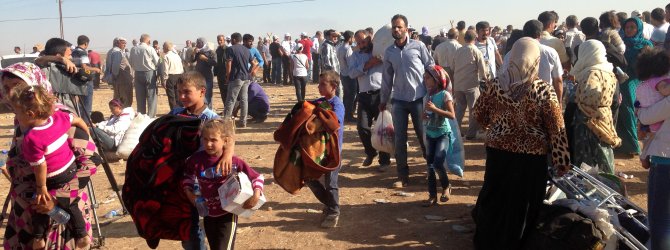-
What’s Inspiring WANA: Jordan’s Resilience Amidst ...
What’s Inspiring WANA: Jordan’s Resilience Amidst Regional Crises

Every few years, when it becomes apparent that the favoured approach is not winning the fight against world poverty and conflict, a new jargon emerges. The latest catchphrase is resilience, a concept initially coined in the natural sciences. After a quick perusal of the websites of international development agencies, one should be forgiven for thinking that resilience is the answer to almost every 21st century challenge, from human security, to terrorism and climate change. Honing in on what is meant by resilience, what it promises and how it can be delivered is far more difficult. But as demonstrated by Jordan’s management of the current refugee crisis, resilience is less often evidenced by things staying the same, but instead by what changes in the face of the unexpected.
Against the backdrops of the Jasmine Revolution, the fall of Hosni Mubarak, passing through the civil wars in Libya and Yemen, and the brutal Syrian conflict, scholars and policy-makers have lined up to credit Jordan on its ‘resilience’ against the Arab Uprisings. Certainly, the Kingdom did experience protests, but was it the government’s quick reforms, the citizenry’s genuine respect for the monarchy, or the country’s inherent resilience, that forestalled an escalation? Arguably, the challenges faced in Jordan today are far more serious than those in 2011. It ranks number two globally in terms of water scarcity, is managing an unprecedented refugee influx, and faces the threat of violent extremism on two borders. Still, Jordan manages to maintain stability. The question is how?
As defined by the Stockholm Resilience Centre, resilience is “the capacity of a system, be it an individual, a forest, a city or an economy, to deal with change and continue to develop. It is about the capacity to use shocks and disturbances to spur renewal and innovative thinking”. Resilience is thus not just about enduring the impacts of regional, environmental and political turmoil, but about evolving, embracing opportunity, and feeding off from disorder.
Jordan’s 630,000 registered Syrian refugees have strained the economy, exacerbated stress on natural resources and created new social burdens for host communities. But the country has not sat idle waiting for the international community to feed the hungry. It has used the crisis as an opportunity to restructure its economy.
At the London refugee conference early this month, Jordan presented a strategy focused on job creation, host community rehabilitation, and improved health services, education and infrastructure. This thinking was rewarded, Jordan having secured more than USD1 billion in pledges and an easing of EU rules of origin requirement. If it is not already thinking along such lines, the next step should be positioning itself as a lead entity in the post-conflict reconstruction of Syria. This is not opportunism, it is strategic: resilience at its core.
Looking at the Syrian crisis as an opportunity to develop, invest in growth, and build new models for sustainable solutions has not limited to the public sector. The crisis has created space for ground-breaking innovation. For instance, a group of tech-savvy entrepreneurs teamed up with UNHCR to start using Iris Guard on a large scale – a system which enables refugees to access their funds without the need for a bank card or a pin code. This form of identification has been lauded as the most effective and efficient means of disseminating humanitarian assistance in the world. Literally hope in the blink of an eye!
Another example is ROW (Refugee Open Ware) – an Amman-based start-up using 3-D printing and wireless technology to build prosthetics, including myoelectric arms that can be controlled by users for refugee amputees. These start-ups, entrepreneurial spirit and innovation are fascinating, and must be regarded as the cornerstone of Jordan’s resilience.
So how did Jordan maintain stability? That might be the wrong question to ask. Resilience is not about building stability; it is about embracing chaos through innovation. And how governments, start-ups and individuals are doing this should inspire all of WANA to do the same.

